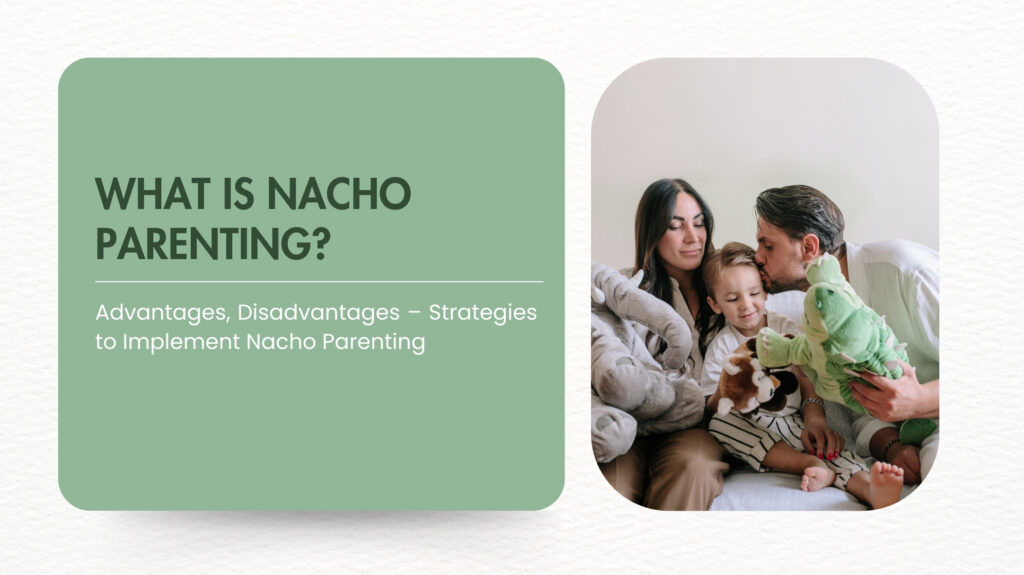What is Nacho Parenting? – Advantages, Disadvantages – Strategies to Implement Nacho Parenting
This post was last updated on April 9th, 2024

Parenting holds immense significance as it plays a pivotal role in the holistic development of individuals and the fabric of society. At its core, parenting is the foundation of a child’s growth, shaping their cognitive, emotional, and social well-being. Through nurturing relationships, parents cultivate the emotional intelligence of their children, fostering resilience and a secure attachment that underpins healthy interpersonal connections.
Moreover, parenting serves as the primary avenue for imparting values, ethics, and cultural identity, influencing a child’s moral compass and societal integration. The family unit, guided by effective parenting, acts as the initial socialization agent, introducing children to norms, traditions, and acceptable behaviours.
Parents are influential role models, shaping their children’s attitudes, beliefs, and aspirations. Educational support from parents is instrumental in fostering a positive attitude toward learning, encouraging curiosity, and laying the groundwork for academic success.
In times of adversity, parents provide a sanctuary of safety and security, creating an environment where children can navigate challenges with resilience. Effective communication within the family not only builds strong bonds but also equips children with essential interpersonal skills.
Ultimately, the significance of parenting extends beyond the household, contributing to the formation of responsible, compassionate, and well-adjusted members of society. The impact of positive parenting reverberates through generations, shaping the future by nurturing confident, empathetic individuals capable of contributing meaningfully to the world.
What is Nacho Parenting?
In various manifestations, parenting provides a significant avenue to influence the upcoming generation. Amid the diverse array of parenting methodologies that have surfaced, one distinctive approach is “Nacho Parenting,” which presents a distinctive amalgamation of disengagement and participation, particularly in the context of step-parenting dynamics. Yet parents need to be well aware of the strategies to implement Nacho Parenting in practical life. Despite the name evoking images of cheesy tortilla chips, the strategy is anything but trivial. Instead, it symbolizes the role of the non-biological parent within a blended family. This exploration aims to delve into the core principles, benefits, and possible challenges associated with Nacho Parenting, as well as strategies for its effective implementation.
Nacho Parenting represents a philosophy embraced mainly by step-parents, characterized by a deliberate decision to refrain from deeply engaging in the discipline or decision-making processes for their stepchildren. Instead, they prioritize the involvement of biological parents in assuming the primary roles, facilitating a more organic connection and mitigating potential conflicts. This approach, often described as letting it be “not nacho” problem, cultivates harmony within blended families and minimizes avoidable tensions.
How Nacho Parenting strategy works?
The Nacho Parenting approach may appear somewhat abstract to those not acquainted with the concept. Fundamentally, it involves a shift in perspective, with step-parents prioritizing relationship-building over authoritative responsibilities. Through the nacho parenting method, clear boundaries are established, and a culture of understanding is fostered. Let’s explore the nuanced workings of this approach through several foundational principles:
- Building Trust as the Priority:
The cornerstone is the relationship itself. Initial efforts focus on establishing trust with the stepchild rather than immediately assuming authoritative roles.
- Delegating Discipline:
In situations requiring discipline, the biological parent takes the lead. This approach aims to prevent potential resentment from the stepchild towards the step-parent.
- Fostering Open Communication:
Sustaining open communication between the biological parent and step-parent is crucial. This ensures alignment and allows collaborative addressing of any concerns regarding the child.
- Prioritizing Empathy Over Authority:
The nacho parenting method underscores the importance of comprehending the child’s emotions and perspectives. Instead of rigidly enforcing rules, the step-parent extends empathy and support.
- Acknowledging Individual Roles:
In a blended family, each member plays a distinct role. Valuing and respecting these roles is vital to prevent anyone from feeling alienated or marginalized.
- Fortifying the Parental Partnership:
While the step-parent may choose a less direct role in parenting, it remains imperative for them to fully support their partner’s decisions. This unified stance is crucial for maintaining family stability.
- Adaptability and Flexibility:
Recognizing the complexity of blended families, the nacho parenting method underscores the importance of adaptability. It acknowledges that each family dynamic is unique, requiring flexible and varied approaches.
Incorporating these principles facilitates blended families in navigating the intricate balance of roles and relationships, ensuring that every member experiences a sense of value and understanding. Hence, the strategies to implement Nacho Parenting is new approach to raise step kids without any possible conflicts.
Advantages and Disadvantages of Nacho Parenting
Within the domain of blended families, the Nacho Parenting approach has gained recognition and adoption for its distinct outlook on step-parenting. Despite its advantages, particularly in enhancing relationships, this approach is not devoid of drawbacks. Let’s thoroughly examine the merits and demerits of adopting the nacho step-parenting strategy.
Advantages
- Strengthened Relationship Development:
Placing a lesser emphasis on discipline and a greater focus on connection allows step-parents to cultivate an authentic bond with their stepchildren.
- Mitigated Resentment:
Delegating disciplinary actions to the biological parents diminishes potential resentment that stepchildren might harbour towards their step-parent.
- Unified Parenting Approach:
By having the primary parenting decisions originate from the biological parents, there is a heightened consistency in rules and values within the family.
- Alleviated Pressure on Step-parent:
Stepping away from direct parenting responsibilities provides the step-parent with the necessary space, facilitating a smoother transition into the blended family.
- Enhanced Understanding:
The practice of “Nachoing” establishes an atmosphere of empathy and patience, making it more accessible for step-parents to comprehend the feelings and behaviours of their stepchild.
Disadvantages
- Perceived Lack of Engagement:
Some stepchildren may interpret the step-parent’s limited involvement in disciplinary matters as disinterest or indifference.
- Potential for Misunderstandings:
In the absence of open communication, the stepchild might misconstrue the reasons behind adopting the nacho step-parenting approach.
- Overburdening the Biological Parent:
This method may impose a heavier burden on the biological parent, leaving them as the sole disciplinarian.
- Inconsistency in Parenting:
If not implemented judiciously, noticeable discrepancies in parenting methods may arise between the step-parent and biological parent.
- Potential to Foster Divisions:
In the absence of proper understanding, this approach has the potential to create divisions within the family, causing the step-parent to feel isolated.
- Complex Adaptation:
The line between “nachoing” and complete detachment can be thin, necessitating ongoing evaluation and adjustment.
- May Not Suit All Families:
Each blended family has its unique dynamics, and the Nacho Parenting method might not be suitable for everyone.
Navigating the intricate landscape of blended family dynamics is complex, and while the Nacho Parenting approach offers a distinctive perspective, its success relies on careful execution and continuous communication. Amidst the process of understanding the strategies to implement Nacho Parenting in practical life, there are few shortcoming that parents should be prepared for as well.
Simple Strategies to Implement Nacho Parenting
Embarking on the Nacho Parenting journey involves more than comprehending the philosophy; it demands practical steps for its integration into daily life. For those contemplating or initiating this approach, here are actionable tips to facilitate a seamless transition and promote positive outcomes for your blended family.
- Emphasize Relationship Building:
Dedicate time to understand your stepchild’s preferences, dislikes, and interests. Plan and engage in activities together to nurture an authentic bond.
- Maintain Alignment with Your Partner:
Regularly engage in discussions with your spouse about roles, responsibilities, and any challenges encountered to uphold a unified approach.
- Establish Definite Boundaries:
Recognize the moments to intervene and those to step back. Clearly articulate these boundaries for both yourself and the child.
- Be an Attentive Listener:
Ensure your availability for your stepchild to express feelings, share thoughts, or seek advice, even if you aren’t the primary decision-maker.
- Educate Yourself:
Delve into Nacho Parenting literature, attend workshops, or participate in online forums to glean insights from other step-parents’ experiences.
- Solicit Feedback:
Periodically inquire with your partner and stepchild about their sentiments regarding the relationship dynamics to facilitate ongoing improvement.
- Exercise Patience:
Constructing trust and rapport is a gradual process. Exercise patience and afford the relationship the time it requires.
- Celebrate Small Achievements:
Acknowledge and celebrate minor milestones in your relationship with your stepchild.
- Refrain from Negative Discourse:
Avoid speaking negatively about the child’s other biological parent in their presence, which is one of the best strategies to implement Nacho Parenting.
- Remain Adaptable:
Recognize that every child is unique. What proves effective for one may not for another, necessitating a willingness to adjust your approach as required.
- Seek Professional Guidance:
If faced with seemingly insurmountable challenges, consider enlisting the assistance of a family therapist or counsellor.
Nacho Parenting constitutes an ongoing journey of learning and adaptation. With the right mindset and adherence to these practical steps, step-parents can foster a harmonious and affectionate environment in their blended families.
Is Nacho Parenting a Healthy Strategy?
Selecting a parenting approach is an intimate decision that should align with the unique requirements of each family member. Nacho Parenting, characterized by its focus on comprehension, delineated boundaries, and limited step-parent involvement, holds the potential for transformation in certain families. Nevertheless, its efficacy hinges on the pre-existing dynamics, relationships, and communication patterns within the blended family.
Recommended For You
Can Moms Have it All? Balancing Kids, Work, and Essential Self-Care
Priyadarshini Muduli
A full time passionate writer with imperishable determination to bring healthy, smart and pragmatic changes individually and socially. Concentrate especially on lifestyle, life and personal improvement, relationships, mental health and behavior, viral issues and literature based subjects.




